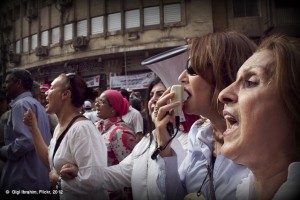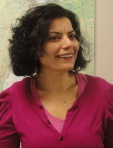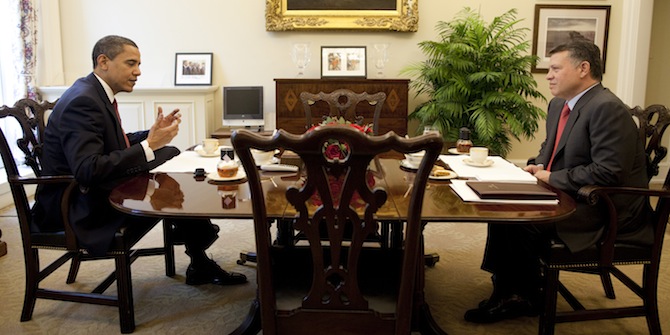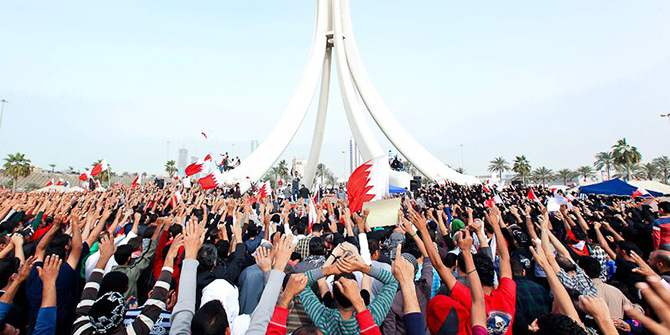By Dr Aitemad Muhanna
This piece is part of a forthcoming report to be published by the Norwegian Peacebuilding Resource Centre.
 As the Arab uprisings have unfolded, Arab women have stood shoulder to shoulder with men, struggling for a better future for themselves and for their male counterparts. Arab women, equally with men, have shown no fear of the regimes and their militaries. Although gender issues have not been the main focus of protesters’ demands, the equal participation of women in the mass protests has contributed to gender-equalising the protesters’ demands. However, women’s consciousness and aspirations to join the protests do not necessarily reflect a single ideological, political and feminist framework.
As the Arab uprisings have unfolded, Arab women have stood shoulder to shoulder with men, struggling for a better future for themselves and for their male counterparts. Arab women, equally with men, have shown no fear of the regimes and their militaries. Although gender issues have not been the main focus of protesters’ demands, the equal participation of women in the mass protests has contributed to gender-equalising the protesters’ demands. However, women’s consciousness and aspirations to join the protests do not necessarily reflect a single ideological, political and feminist framework.
Women’s participation in the Arab uprisings has come at a time when an Islamist-based model of Arab women’s activism has flourished in most Arab countries against a gradual shrinking of secular liberal women’s activism. Meanwhile, many secular liberal women and women’s organisations in the region fear losing what they have achieved in terms of their individual liberty and human rights under the previous secular regimes. However, the victory of Islamists, particularly the moderate parties, is promising for the women’s movement, compared with the past period, which was characterised by militarisation, violence and violations of international human rights.
The uprisings have demonstrated that it is possible for secularism and Islamism to work together in dealing with new socio-economic, political and feminist challenges. In Tunisia, for example, the victorious Islamist party al-Nahda favoured maintaining the country’s progressive personal status codes, which grant Tunisian women the same rights as Tunisian men. Al-Nahda has also publicly expressed its unwillingness to impose a conservative dress code upon Tunisian women and showed its commitment to the Committee on the Elimination of Discrimination against Women, a UN expert body that watches over the progress for women made in countries that are party to the 1979 Convention on the Elimination of All Forms of Discrimination against Women. In the Tunisian elections in October, women won around 25 percent of the seats in the new Constituent Assembly, whereas they had won only 11 percent under Ben-Ali’s secular regime.[1]
In Egypt, despite the complexity of the post-uprising context as compared with Tunisia, the initial victory of the Islamist parties in the November 2011 parliamentary election apparently resulted from the enormous participation of poor and less educated Egyptian women. The moderate voices of some leaders of the Muslim Brotherhood, such as Abou el-Fotouh is attractive to many secular Muslim and non-Muslim people in Egypt, especially young and educated Muslim women. These voices also encouraged the conservative leaders of the Muslim Brotherhood to moderate their political and social agenda aiming to keep a united vision for the Brotherhood. “The new Egyptian government,” said Fattouh, “will be based on constitutional law and stand on respect for human rights, equality between men and women, and independence of the judiciary.”
While secular liberal women and women’s organisations in the region may fear to lose what they have achieved under the previous regimes, the political victory of the moderate Islamist parties can be perceived as a starting point for reshaping the world order, something that will benefit secular and Islamist women alike. The victory of moderate Islamists, particularly the moderate parties, is promising, compared with the past period which was characterised by militarisation, violence and violations of international human rights. Their political victory can be perceived as a starting point for reshaping the world order. For the first time in the contermporary history of the Middle East, antagonism between Islamism and secularism, among other historical binaries, may be coming to an end. After the end of the Al-Qaeda threat, both Islamist and secular forces, especially the ones in Europe, have realised that militarisation has become a serious burden on their economies and political stability, and not a solution to any form of conflict in the region.
A number of political leaders in Europe have realised that Islamist politicians are pragmatic enough to negotiate debatable political, economic and social issues, especially when they are in a position to provide a governing model with negotiable foreign policies and international relations. The determining factor in combining Islamism with secularism, and Islam with democracy, is the willingness of the two major players to ensure that the main debatable issues – religion, gender and human rights – are not discriminated against in the name of either Islam or Western democracy. However, the actual practice and outcomes of the moderate Islamist discourse remain to be seen, and it is the task of Islamist and secular women’s and human rights organisations to cooperate, monitor, negotiate and strategise to ensure that gender issues are engaged in policy discussions and formulations as a substantial issue in real democratisation. With that in mind, the following are a set of gender-based recommendations for bilateral and multilateral actors:
1) Put Islamist conservative leaders in contact with Islamic feminists [2] in the MENA region and in Europe and encourage democratic discussions on issues of gender incorporation in governments within Islamic frameworks.
2) Support female Islamist leaders in getting involved in mutual learning visits in countries that have experienced a successful model of constitutional change, particularly the reform of Sharia law, within Islamic frameworks, such as Turkey, Morocco and the recent experience of Tunisia. Also integrate these women into international gender-based forums in order to acquaint them with the new gender challenges they face in their home countries.
3) Push towards cooperation between secular liberal women’s organisations and Islamist female leaders in government and non-government organisations: the secular organisations can provide the Islamist leaders with their experience in women’s activism and struggle for gender mainstreaming in government institutions and policies, and encourage the female moderate Islamists to resist patriarchal interpretations of Islam.
4) Support a link between the mosques movements – which used to be the main source of conservative Islamist knowledge, as well as the major site of women’s mobilisation – and civil society and government institutions, in which the moderate interpretation of Islam can be mobilised and applied in the day-to-day dynamics used by poor and uneducated women living in marginalised areas.
5) The victory of Islamists would raise women’s participation in the labour market, at least in the first phase, because Islamists usually put forward their female members as favoured candidates to fill any gaps in the labour market (see the experience of Hamas and Hizbullah). This is a good opportunity to challenge the conservative Islamists by supporting women’s economic development programmes and advocating for women’s equal participation in education and in the labour market within the moderate Islamic framework.
Following these recommendations is undoubtedly a long-term process full of contingencies of success and failure, but it has the potential to liberalise political Islam and Islamic women’s activism. This depends on the capacity of women’s and human rights organisations in the region to know how to invest in Islamic frameworks, disregarding gender labelling, to ensure gender equality. Through this, religion, in time, may remain a symbol of identity, but not a constraint to women’s equal participation in development and politics.
____________________________________________________________
[1] See United Nations Development Programme and Regional Bureau for Arab States [RBAS], “Arab Human Development Report 2005: Towards the Rise of Women in the Arab World”, 2005.
[2] The Islamic feminist discourse refers to the Qur’an and Sunna to work towards women’s advancement and gender equality, and some of its scholars urge the possibility of occupying common ground with secular feminists in their attempts to improve women’s legal status and social positions. Islamic feminists have gained increasing recognition by many Western scholars, feminists and non-feminists and they have, to a growing extent, positively influenced the social agenda of the male-dominated Islamist parties or movements in the MENA region. See Val Moghadam’s Islamic Feminism and the Its Discontents: Notes on Debate.
 Dr Aitemad Muhanna is a research fellow at LSE’s Middle East Centre pursuing post-doctoral research on gender, religion and sustainable human development in Palestine. Originally from the Gaza Strip, Dr Muhanna has extensive experience as a gender and development specialist and activist in the area. For the past 20 years, she has worked on policy-oriented research programmes and publications for Oxfam UK, Sida, UNIFEM, UNDP and the World Bank. For more information about Dr Muhanna, click here.
Dr Aitemad Muhanna is a research fellow at LSE’s Middle East Centre pursuing post-doctoral research on gender, religion and sustainable human development in Palestine. Originally from the Gaza Strip, Dr Muhanna has extensive experience as a gender and development specialist and activist in the area. For the past 20 years, she has worked on policy-oriented research programmes and publications for Oxfam UK, Sida, UNIFEM, UNDP and the World Bank. For more information about Dr Muhanna, click here.






